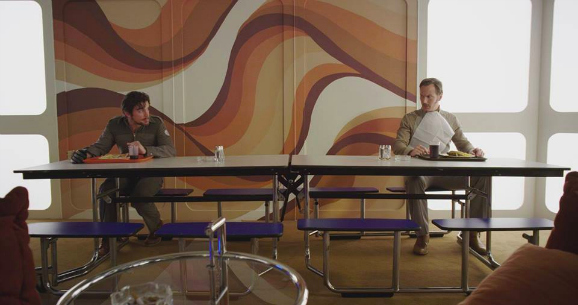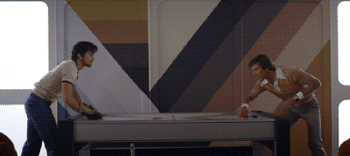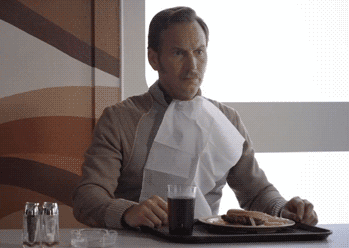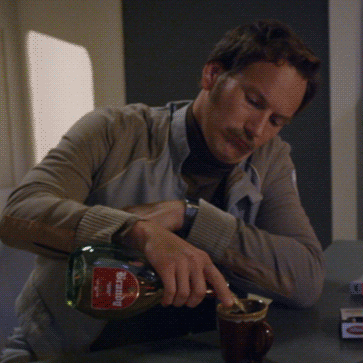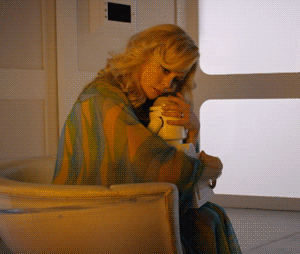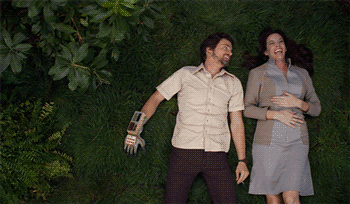Jack Plotnik’s vision of mundane human life in an unrealized Buck Rogers’ style future, Space Station 76, is a weird creature, no two ways about it. The film, which premiered at SXSW this year, was based on a stage play of the same name and that shows in the framing of many of Space Station 76‘s best scenes: one or two characters sitting in angry silence in sparse, bone white rooms that evoke the interior of the rebel freighter from the opening of Star Wars. The conceit might suggest that the film is going to be a straightforward screwball comedy, but the final product is something, thankfully, far stranger.
(Spoilers below)
Space Station 76 follows the inhabitants of the titular Omega-class space station, including misanthropic closeted drunk Captain Glenn (Patrick Wilson), new assistant captain Jessica (Liv Tyler), pill-popping housewife Misty (Marisa Coughlan) her mechanic husband, Ted (Matt Bomer, you know that guy from Suits White Collar) and their precocious daughter Sunshine (Kylie Rogers). It’s a soap opera played, well, not straight per se but seriously enough to get you invested. For the people who live and work onboard, Space Station 76 is just a miserable stepping stone to something better: Captain Glenn despises everyone under his charge and is obsessed with getting a promotion and leaving after a love affair with his former second-in-command David goes sour; insufferable space yuppies Donna and Steve (Kali Rocha and Jerry O’Connell) passive-aggressively brag about their relocation to a far more exclusive outpost with a mall, then bitterly complain when no one throws them a going away party.
One thing that’s admirable about the film is that it nicely balances broad comedy with genuine characters. The crew of Space Station 76 are cartoon characters, but with real wants and needs that go painfully unfulfilled. Even though the jokes about Captain Glenn’s latent homosexuality almost dip into cliche, the character doesn’t sacrifice substance for the sake of gags.
On an aesthetic level, Space Station 76 is immaculate. Everyone wears turtlenecks and leisure suits, white plastic rec rooms feature ping pong tables and orange-brown “abstract” artwork. Plotnik loads the movie with smooth 70s hits from Spanky MacFarlane and Todd Rundgren. One of the film’s few genuinely sweet moments involves Neil Sedaka’s “Walking In The Rain” and weightlessness. Here, the film’s attention to detail only further emphasizes the characters’ miserable existence in a future that never was.
Loneliness is ever-present in Space Station 76 and Plotnik’s direction really shines in this department. SS76‘s future has amenities like robot hands and food replicators, but none of it works right and they only serve to isolate human beings from each other. When Tyler’s Jessica attempts to call her father for consolation after a particularly bad day, he attempts to set up a “high tech” video phone so they can see each other, oblivious to how upset she is. Misty spends her days in a Valium haze, largely ignoring her painfully bright and precocious daughter in favor of visits to the ship’s psychiatrist, Dr. Bot (in one of the movie’s best gags, a repurposed Verbot toy from the 80s that stands about a foot tall and yells feel-good platitudes while attempting to maintain professional distance from its human patients).
Ted, his marriage to Misty on the rocks, tries to bury his feelings for Jessica while hallucinating a beautiful naked blonde floating out in space during work hours. When Ted and Jessica finally address their feelings and embrace, Ted’s robotic hand malfunctions and ruins the moment by squeezing her boob too hard. The men and women of Space Station 76 can’t relate to each other outside of fake smiles and superficial generalities; in one brilliant scene, a casual conversation between Misty and Jessica devolves into a frantic screaming match as Misty neurotically chastises her for NOT HAVING A BABY WHY HAVEN’T YOU HAD A BABY YET??? before learning that Jessica is infertile.
Space Station 76‘s performances are strong and, often, surprising. Wilson’s Captain Glenn, a low-rent wannabe Captain Kirk, the kind that would show up in a classic Star Trek episode long enough to get killed by that week’s monster, is a fascinating role against type for an actor who mostly plays pushovers and nice guys. The macho Captain Glenn is a vicious bully, a drunk who masturbates to an edited hologram phone call from a lover he chased away and completely fails to hide his secret homosexuality and obvious alcoholism from his crewmates. When Sunshine attempts to befriend him, he interrupts her to chase her off. “YOU MUST BE SO BORED RIGHT NOW, AREN’T YOU BORED?” Coughlan’s Misty is numb to the needs of her husband and child thanks to an unlimited Valium prescription from Dr. Bot and lashes out through secret trysts with Steve and a one-sided vendetta with Jessica, who she sees as trying to usurp her place as a mother to Sunshine.
The film’s climax, foreshadowed and symbolized by a group of meteorites that the station’s inhabitants fail to do anything about until it’s too late, explodes at the station’s Christmas party. We watch as a quiet party devolves into a screaming match between Misty and Ted, then eventually Glenn and Jessica, as everyone’s feelings finally come out into the open. It’s a powerful, uncomfortable scene completely bare of any kind of humor. By the time it’s over, the dynamics of the ship have changed forever; Ted and Misty’s marriage is over but Captain Glenn may just finally have found someone. We don’t get more than hints as to where these characters will go from here and that’s okay. Space Station 76 doesn’t offer any promises about the future, only the glimmering hope of progress.
Space Station 76 is now playing in limited release at Quad Cinema. It will be available on video on demand on September 23rd and on DVD on September 30th.

